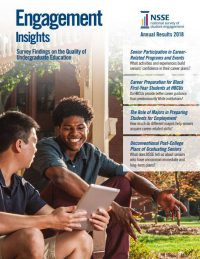Due to their positive associations with student learning and retention, certain undergraduate opportunities are believed to be “high-impact.” High-Impact Practices (HIPs) share several traits: They demand considerable time and effort, facilitate learning outside of the classroom, require meaningful interactions with faculty and students, encourage collaboration with diverse others, and provide frequent and substantive feedback.
It may be useful to know which factors are associated with greater, and lesser, participation in HIPs. As a guide, NSSE annually displays the percentage of U.S. respondents who participated in six high-impact practices by selected student and institution characteristics in the Annual Results.
In general, results show the following:
- oSeniors at Baccalaureate Arts and Sciences Colleges experienced the most HIPs at considerably higher rates.
- HIP participation did not vary by gender but did vary somewhat by race/ethnicity, with some students of color less likely to have done research with faculty, study abroad, or an internship or field experience.
- HIP participation was more common among traditional-age students and those enrolled full-time, and somewhat less common among first-generation and transfer students.
- HIP participation varied by major field category. For example, seniors in the biological sciences (including related fields such as agriculture and natural resources) and physical sciences (including math, computer science, etc.) were more likely to participate in research with faculty, while those in education and social service professions were more likely to participate in service-learning.
Are Students Meeting the HIP Challenge?
NSSE recommends that institutions make it possible for all students to participate in at least two HIPs over the course of their undergraduate experience--including one in the first year and another in the context of the major. Figure 1 displays the percentage of students who participated in High-Impact Practices by class level. About 3 in 5 first-year students participated in at least one HIP, and about 5 out of 8 seniors participated in at least two HIPs.
Figure 1: Number of HIP Experiences by Class Level
Note: All counts include participation in service-learning, learning community, and research with faculty. The senior counts also include internship or field experience, study abroad, and culminating senior experience.


